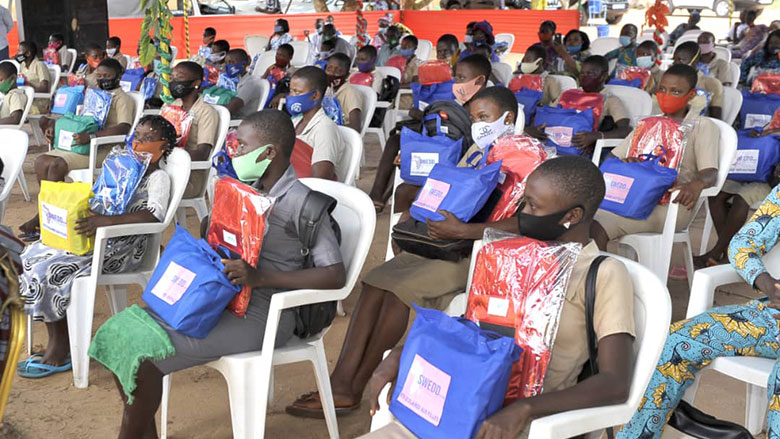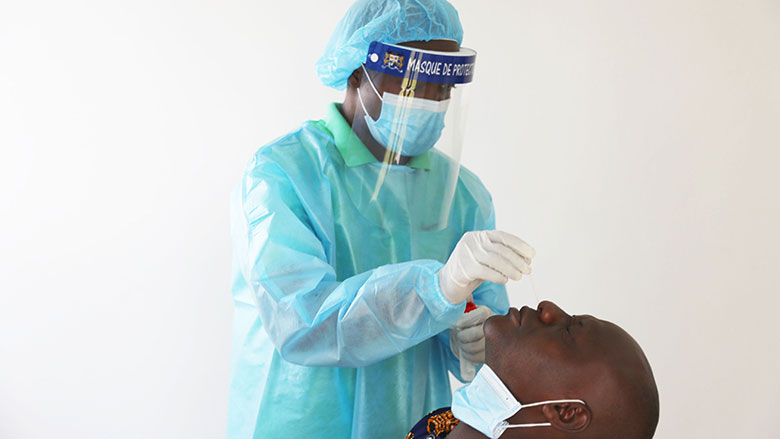Challenge
Prior to the outbreak of the COVID-19 pandemic in January 2020, the assessments of Benin’s health system revealed that the country lacks a robust surveillance system capable of monitoring common diseases. It also lacked the ability to timely trigger alarms to contain disease outbreaks or to rapidly detect and investigate abnormal clustering of cases of illness or death. Key weaknesses include the lack of a qualified and motivated health workforce; insufficient equipment and infrastructure for effective preparedness and response at each level of the health pyramid; and poorly functioning community-based surveillance. Insufficient laboratory infrastructure, equipment and reagents for timely and quality diagnosis was of particular concern. At the outset of the pandemic, COVID-19 test results were confirmed in Senegal, and patients had to wait at least three days to receive their results. The various information systems did not communicate with one other, thus preventing effective monitoring and evaluation. Additionally, infection prevention and control standards were inadequate.
Thus, the challenges can be summarized as helping Benin to rapidly strengthen its epidemiological surveillance system, equip itself to respond effectively to the screening needs of the population and care for the sick, as well as mitigate the social and economic impacts of the crisis. The partial, yet short, containment and mitigation measures adopted by the Government of Benin to control spread of the pandemic had some socioeconomic implications nationwide, particularly on vulnerable people such as women, children and youth, students, and small and medium-sized enterprises, especially in the informal sector. These effects include: (i) a loss of jobs and an increase in unemployment and underemployment that led to a loss of household income and an attendant rise in monetary and non-monetary poverty; (ii) increased food insecurity, especially in rural areas; (iii) enhanced risk of gender-based and sexual violence; and (iv) increased school drop-outs, especially among girls in rural areas.
Approach
The World Bank quickly mobilized additional resources through the Regional Disease Surveillance Systems Enhancement Project (REDISSE), the Benin COVID-19 Preparedness and Response Project, and the Nutrition and Early Childhood Development Project to strengthen the health response. It also used resources from the COVID-19 Education Response Project to support the return of children to school. The Sahel Women's Empowerment and Demographic Dividend Project targets girls who are at high risk of dropping out of school, encouraging them to continue studying.
About 97 percent of all the resources mobilized for the health response were disbursed in 8 months to ensure rapid assistance to the more than 2,400 patients, hospitals, and other beneficiaries. This was made possible by overcoming bureaucratic delays and adopting simplified fiduciary measures. The Bank program’s response to the COVID-19 pandemic in Benin is reflected in the Benin Country Partnership Framework (2018-2023), which emphasizes the need to protect against epidemics and improve disease surveillance systems.
Results
The World Bank has helped Benin to strengthen its public health system. The following outcomes have been achieved after 8 months of implementation:
- Design and implementation of a pandemic communications and citizen engagement strategy, which was translated into six local languages.
- About 105 training sessions concerning surveillance, contact tracing, infection prevention and control, case management, and risk communications.
- Fifteen border surveillance sites equipped with thermal cameras.
- Financial support for those hotels that were used for isolating air travelers.
- Catering to isolated and/or hospitalized patients and health workers in treatment centers.
- Commissioning of 13 laboratories equipped with 12 COVID-19 test machines, extraction kits, diagnostic reaction kits, 40 biosafety cabinets and cold chain equipment.
- Eighty-nine screening centers created and equipped.
- Protective equipment made available to over 6,000 workers in laboratories and treatment centers.
- Two prefabricated hospitals built in Abomey-Calavi and Natitingou.
- Commissioning of three treatment centers with about 100 beds, plus emergency and intensive care materials and equipment.
- Training and staffing of the three treatment centers, 13 laboratories, the SAMU emergency medical service, and 80 rapid response teams.
- Training of three psychologists and all health personnel at the port and airport of Cotonou.
- Purchase of nine fully equipped ambulances.
- Acquisition of cloth masks made by local craftspeople.
- Twenty-three thousand school kits distributed to benefit girls and adolescents in all 77 communes of Benin.
The World Bank Group Contribution
With US$42 million disbursed, the World Bank is providing the bulk of donor support for the pandemic response in Benin. Large-scale technical and financial investments have significantly strengthened the Government’s capacity to control the spread of the outbreak. These efforts have enabled Benin to mount one of the most effective responses in Sub-Saharan Africa in fighting the COVID-19 pandemic.
Partners
In addition to its financial contribution, the World Bank is engaging with numerous partners to support the implementation of the Benin COVID-19 Health Response Plan. Partners include the Belgian government, the European Union, the French Development Agency, the Japan International Cooperation Agency, the United Nations Children's Fund, the United Nations Development Programme, the United Nations Population Fund, the United States Agency for International Development, the Vaccine Alliance, the World Health Organization, as well as Plan International, an international non-governmental organization (NGO).
Moving Forward
Additional funding of US$30 million is being prepared to support the deployment of a national immunization campaign. The World Bank is continually assessing solutions for limiting the pandemic’s impact, especially on vulnerable populations.

Beneficiaries
Health Professionals Welcome Rapid Response Measures
Working on the front lines in the fight against COVID-19, many health professionals have contracted the virus, such as Mr. Isidore Lokonon, Head of Nursing Care at the Emergency Medical Assistance Service (Samu-Benin). After testing positive, his concern was alleviated, in part, by a heightened level of logistics deployed in care centers, made available through World Bank financing. "When the results of my test were announced, I was shocked. I immediately regained my serenity because I was convinced that I would get through the treatment. Benin is well-equipped to deal with Covid-19", he said. "The equipment and materials allowed us to go faster and more efficiently".
Beyond direct support to health professionals in equipping them to care for their patients, he praises enhanced screening, the rapid care of patients, and an overall quick response which has proven essential for gaining early control of the pandemic.
"The World Bank intervened as soon as possible and as best as it could to contain the disease. Benin did not have enough intensive care beds. The need became more pronounced with the advent of COVID-19 but, very quickly, this gap was filled," added Eugène Zoumènou, Director of Samu-Benin.
"When we see what is happening around the world, we can be happy that Benin very quickly realized the seriousness of the situation and was able, thanks to partners such as the World Bank, to mobilize financial, technical and human resources for a rapid, organized and effective response," said Rodrigue Glèlè Aho, Coordinator of the Epidemic Treatment Center at Allada Hospital, 50 kilometers from Cotonou. "The constancy and regularity of the support provided by the institution [World Bank] were decisive in the response. This has made it possible to maintain during all these months, the level of requirement in prevention and care of patients’’.
As of April 20, 2021, more than 1,900 health workers have directly benefited from World Bank support.
In Benin, World Bank support to laboratories has increased the country’s testing capacity and contributed to bringing the pandemic quickly under control.
"The School Kits will Keep us in School"
To facilitate the return of children to school at the start of the 2020-2021 school year, 23,000 school kits have been distributed to benefit girls and adolescents as part of the Sahel Women's Empowerment and Demographic Dividend Project (SWEDD-Benin).
"We are honored to receive this commendable gesture towards us, girls and teenagers of the commune of Tori-Bossito, through school kits that will keep us in school. For our parents who cannot afford it in this period of coronavirus, it is a relief and an encouragement not to leave the girls at home," said Marlène Fandjinou, a student at the General Education College in Tori-Bossito. "We will make good use of it and promise to work harder in school and college to continue to benefit from this sustained attention from the Government and the World Bank’’.
